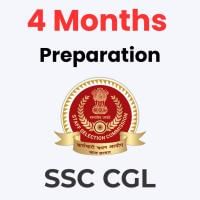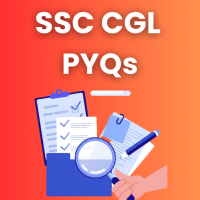SSC CGL Exam > SSC CGL Questions > What would be the indirect speech form of the...
Start Learning for Free
What would be the indirect speech form of the sentence: "She said, 'I shall be there by 7 p.m.'"?
- a)She said that she would be there by 7 p.m.
- b)She said that she should be there by 7 p.m.
- c)She said that she will be there by 7 p.m.
- d)She said that she shall be there by 7 p.m.
Correct answer is option 'A'. Can you explain this answer?
Verified Answer
What would be the indirect speech form of the sentence: "She said, 'I ...
In indirect speech, the future tense "shall" changes to "would." Therefore, the correct transformation is "She said that she would be there by 7 p.m."
View all questions of this test
Most Upvoted Answer
What would be the indirect speech form of the sentence: "She said, 'I ...
Understanding Indirect Speech
Indirect speech, also known as reported speech, is a way of conveying what someone has said without quoting their exact words. It often involves changes in pronouns, verb tenses, and time expressions.
Analyzing the Given Sentence
Original Sentence:
“She said, ‘I shall be there by 7 p.m.’”
When converting this to indirect speech, several transformations occur:
Key Transformations:
- Pronoun Change: The first-person pronoun "I" changes to "she" to reflect the perspective of the speaker.
- Verb Tense Change: The future tense "shall" (used in British English) changes to "would" in indirect speech. This is a standard shift when reporting speech from the present to the past.
- Time Expressions: The time phrase "by 7 p.m." remains unchanged, as it is a specific time reference.
Correct Indirect Speech Form
The correct transformation of the original sentence into indirect speech is:
“She said that she would be there by 7 p.m.”
Why the Other Options Are Incorrect:
- Option b: "should" implies obligation, not future intention.
- Option c: "will" does not reflect the past reporting context.
- Option d: "shall" is generally replaced by "would" in indirect speech.
In conclusion, the correct answer is option a, as it maintains the intended meaning while adhering to the rules of indirect speech.
Indirect speech, also known as reported speech, is a way of conveying what someone has said without quoting their exact words. It often involves changes in pronouns, verb tenses, and time expressions.
Analyzing the Given Sentence
Original Sentence:
“She said, ‘I shall be there by 7 p.m.’”
When converting this to indirect speech, several transformations occur:
Key Transformations:
- Pronoun Change: The first-person pronoun "I" changes to "she" to reflect the perspective of the speaker.
- Verb Tense Change: The future tense "shall" (used in British English) changes to "would" in indirect speech. This is a standard shift when reporting speech from the present to the past.
- Time Expressions: The time phrase "by 7 p.m." remains unchanged, as it is a specific time reference.
Correct Indirect Speech Form
The correct transformation of the original sentence into indirect speech is:
“She said that she would be there by 7 p.m.”
Why the Other Options Are Incorrect:
- Option b: "should" implies obligation, not future intention.
- Option c: "will" does not reflect the past reporting context.
- Option d: "shall" is generally replaced by "would" in indirect speech.
In conclusion, the correct answer is option a, as it maintains the intended meaning while adhering to the rules of indirect speech.

|
Explore Courses for SSC CGL exam
|

|
Question Description
What would be the indirect speech form of the sentence: "She said, 'I shall be there by 7 p.m.'"?a)She said that she would be there by 7 p.m.b)She said that she should be there by 7 p.m.c)She said that she will be there by 7 p.m.d)She said that she shall be there by 7 p.m.Correct answer is option 'A'. Can you explain this answer? for SSC CGL 2025 is part of SSC CGL preparation. The Question and answers have been prepared according to the SSC CGL exam syllabus. Information about What would be the indirect speech form of the sentence: "She said, 'I shall be there by 7 p.m.'"?a)She said that she would be there by 7 p.m.b)She said that she should be there by 7 p.m.c)She said that she will be there by 7 p.m.d)She said that she shall be there by 7 p.m.Correct answer is option 'A'. Can you explain this answer? covers all topics & solutions for SSC CGL 2025 Exam. Find important definitions, questions, meanings, examples, exercises and tests below for What would be the indirect speech form of the sentence: "She said, 'I shall be there by 7 p.m.'"?a)She said that she would be there by 7 p.m.b)She said that she should be there by 7 p.m.c)She said that she will be there by 7 p.m.d)She said that she shall be there by 7 p.m.Correct answer is option 'A'. Can you explain this answer?.
What would be the indirect speech form of the sentence: "She said, 'I shall be there by 7 p.m.'"?a)She said that she would be there by 7 p.m.b)She said that she should be there by 7 p.m.c)She said that she will be there by 7 p.m.d)She said that she shall be there by 7 p.m.Correct answer is option 'A'. Can you explain this answer? for SSC CGL 2025 is part of SSC CGL preparation. The Question and answers have been prepared according to the SSC CGL exam syllabus. Information about What would be the indirect speech form of the sentence: "She said, 'I shall be there by 7 p.m.'"?a)She said that she would be there by 7 p.m.b)She said that she should be there by 7 p.m.c)She said that she will be there by 7 p.m.d)She said that she shall be there by 7 p.m.Correct answer is option 'A'. Can you explain this answer? covers all topics & solutions for SSC CGL 2025 Exam. Find important definitions, questions, meanings, examples, exercises and tests below for What would be the indirect speech form of the sentence: "She said, 'I shall be there by 7 p.m.'"?a)She said that she would be there by 7 p.m.b)She said that she should be there by 7 p.m.c)She said that she will be there by 7 p.m.d)She said that she shall be there by 7 p.m.Correct answer is option 'A'. Can you explain this answer?.
Solutions for What would be the indirect speech form of the sentence: "She said, 'I shall be there by 7 p.m.'"?a)She said that she would be there by 7 p.m.b)She said that she should be there by 7 p.m.c)She said that she will be there by 7 p.m.d)She said that she shall be there by 7 p.m.Correct answer is option 'A'. Can you explain this answer? in English & in Hindi are available as part of our courses for SSC CGL.
Download more important topics, notes, lectures and mock test series for SSC CGL Exam by signing up for free.
Here you can find the meaning of What would be the indirect speech form of the sentence: "She said, 'I shall be there by 7 p.m.'"?a)She said that she would be there by 7 p.m.b)She said that she should be there by 7 p.m.c)She said that she will be there by 7 p.m.d)She said that she shall be there by 7 p.m.Correct answer is option 'A'. Can you explain this answer? defined & explained in the simplest way possible. Besides giving the explanation of
What would be the indirect speech form of the sentence: "She said, 'I shall be there by 7 p.m.'"?a)She said that she would be there by 7 p.m.b)She said that she should be there by 7 p.m.c)She said that she will be there by 7 p.m.d)She said that she shall be there by 7 p.m.Correct answer is option 'A'. Can you explain this answer?, a detailed solution for What would be the indirect speech form of the sentence: "She said, 'I shall be there by 7 p.m.'"?a)She said that she would be there by 7 p.m.b)She said that she should be there by 7 p.m.c)She said that she will be there by 7 p.m.d)She said that she shall be there by 7 p.m.Correct answer is option 'A'. Can you explain this answer? has been provided alongside types of What would be the indirect speech form of the sentence: "She said, 'I shall be there by 7 p.m.'"?a)She said that she would be there by 7 p.m.b)She said that she should be there by 7 p.m.c)She said that she will be there by 7 p.m.d)She said that she shall be there by 7 p.m.Correct answer is option 'A'. Can you explain this answer? theory, EduRev gives you an
ample number of questions to practice What would be the indirect speech form of the sentence: "She said, 'I shall be there by 7 p.m.'"?a)She said that she would be there by 7 p.m.b)She said that she should be there by 7 p.m.c)She said that she will be there by 7 p.m.d)She said that she shall be there by 7 p.m.Correct answer is option 'A'. Can you explain this answer? tests, examples and also practice SSC CGL tests.

|
Explore Courses for SSC CGL exam
|

|
Signup for Free!
Signup to see your scores go up within 7 days! Learn & Practice with 1000+ FREE Notes, Videos & Tests.


















